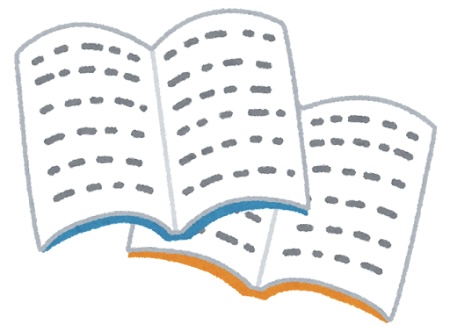The English translation is below
私はいちおう外国人に日本語を教える資格を持っているので
日本語学習のテキストも持っております。
テキストあるあるですけど、なかなかツッコミどころの多い
特に初級ではよそよそしい、生あたたかい会話が繰り広げられて
います
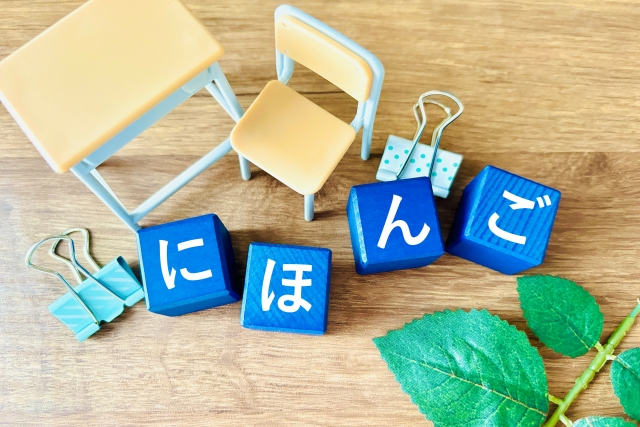
日本語学習では最初に「です・ます」調を学びます
これは学習者(外国人)さんたちにとって不利益にならないように
との思いからなんですね。「です・ます」はていねいで、
相手に敬意を表す文体なので、目上でも目下でも失礼にならず
人間関係を壊すリスクもなく、安全です
ただ、基本的に「親しくない相手」に使うので
ずっとこの調子で話していたら、いつまでたっても相手との
距離は縮まりませんよ♪
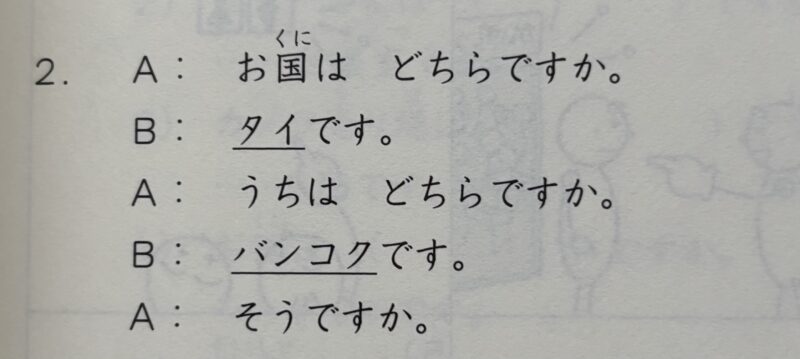
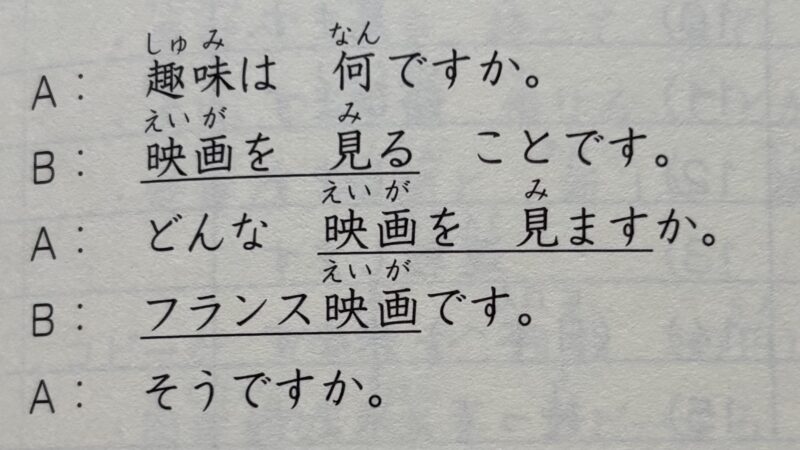
なんて盛り上がらない会話なんでしょう
学習者向けのテキストは、相手に不快感を与えないように
という言い回しに重点を置きすぎてるような気がします
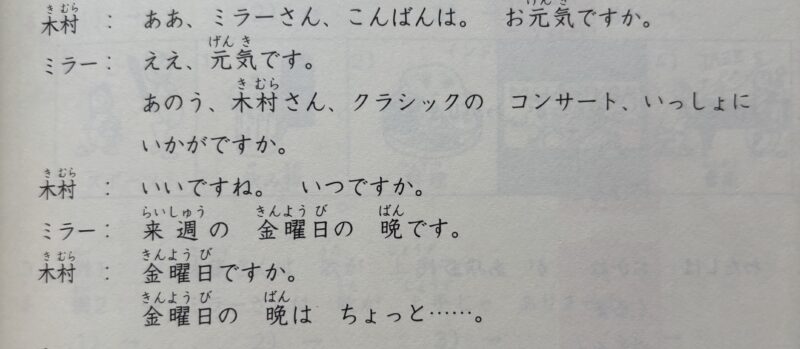
「金曜日の晩は、ちょっと…」晩 よりも夜 の方を使う方が多いと
思うのですが。それに何もここまで日本式の断り方を
強要しなくてもいいんじゃないんですかね(汗)
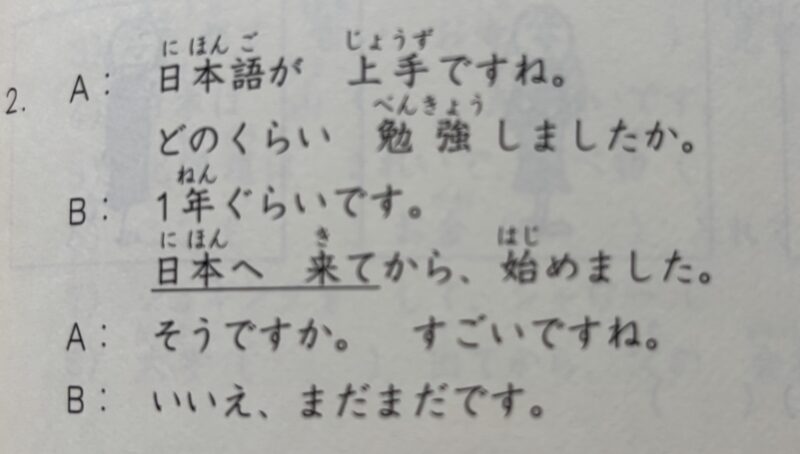
あと、無駄に謙遜しなくていいですから〜
現実にこんな会話はよそよそしすぎなので
とりあえず「です・ます」調を使えるようになったら
知り合いの人を相手にして、自然な口調に慣れていってください
たとえ知らない日本人相手でも、間違いを恐れる必要はないと
思うんですよ。自慢じゃないですが、私たち日本人は英語学習で
散々苦しめられているので、語学学習の大変さをよおく分かっている
つもりです。しかも、日本で!日本人相手に‼︎平気で
ナチュラルスピードの英語で話しかけてくる外国人のかたも
それはもう、たくさんいらっしゃいます(私も体験済み)
そんなとき、日本語で一生懸命伝えようとしている外国人の方
がいたら、こちらも意味を理解しようとがんばってしまいます
時には、迷惑そうな顔をされることもあるかもしれません
でも、どこの国にもイヤな奴はいますから、そういう人に当たったら
たまたま運が悪かった、くらいに思ってください
見た目で相手が外国の人だと分かれば、日本語を間違うのは
想定済みです。ワザとでないことくらい伝わりますよ
私も飲食店で、アルバイトの外国人の女の子に
「お客さま〜 このお皿〜 お下げしていいか?」
と聞かれた時は吹きました(笑)

テキストと、現実の会話のギャップは大きいです
だからこそ初級で終わらずに、レベルアップして
生の会話に近づいていく喜びがあるんですよね♪
Since I’m certified to teach Japanese to non-native speakers, I actually own a few textbooks for learners.
And as anyone who’s ever flipped through one knows, they’re full of moments that make you want to raise an eyebrow.
Especially in beginner-level books — those polite-but-weirdly-stiff, lukewarm conversations never fail to make me smile.
In Japanese language learning, students are first taught to use the desu/masu form.
This comes from a wish to protect learners from potential social missteps.
Because desu/masu is a polite form that shows respect to others, it’s considered safe — you can use it with anyone, whether they’re above or below you, without sounding rude or risking relationships.
However, since the desu/masu form is basically used with people you’re not close to,
if you keep speaking that way all the time, you’ll never really get any closer to them.
What a lifeless conversation that is!
I feel that many Japanese-learning textbooks focus a little too much on avoiding expressions that might offend others.
“Friday night… well, that’s a bit…” — honestly, I think most people would just say yoru instead of ban.
And really, do we have to push learners to turn down invitations in such an overly Japanese way?
And please, you don’t have to be that humble!
In real life, conversations like that would sound way too formal and distant.
So once you’ve got the desu/masu form down, try talking with people you actually know,
and get used to speaking more naturally.
Even when you’re talking to a Japanese person you don’t know, I don’t think there’s any need to be afraid of making mistakes.
Not to brag, but we Japanese have struggled plenty with learning English ourselves, so I like to think we really understand how tough language learning can be.
And in Japan, no less! Facing Japanese people!!
There are plenty of foreigners who boldly speak to us in natural-speed English — and I’ve experienced it myself, too.
When you’re trying your best to communicate in Japanese, we naturally try to understand you.
Sometimes, though, you might get a face that looks a little annoyed.
But people like that exist in every country, so if you run into someone like that, just chalk it up to bad luck.
If someone can tell you’re a foreigner just by looking at you, they already expect that you might make mistakes in Japanese.
They’ll understand that you’re not doing it on purpose.
I’ve also had experiences at restaurants, with foreign girls working part-time…
She said, “Dear customer… can I take this plate?” — and the way she switched from super polite to casual had me bursting out laughing.
The gap between textbooks and real-life conversations can be huge.
That’s precisely why it’s so rewarding to keep moving beyond the beginner level and get closer to real, natural conversations.
